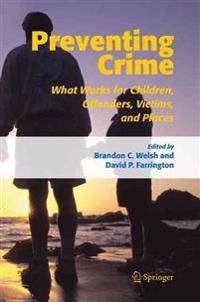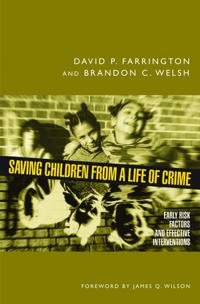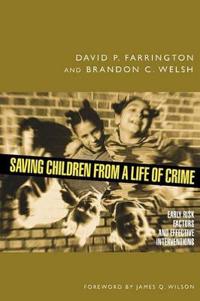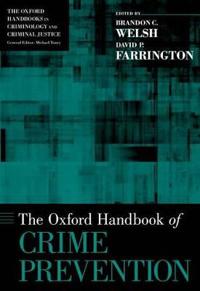Preventing Crime: What Works for Children, Offenders, Victims and Places (Inbunden)
avB. C. Welsh, Brandon C. Welsh, David P. Farrington
ISBN: 9781402042430 - UTGIVEN: 200512Crime prevention should be rational and should be based on the best possible evidence. Decision-makers should weigh heavily any available evidence on what works best. How can a program that has produced no discernable evidence of effectiveness, as shown through numerous evaluations, be considered fo[...]
Saving Children from a Life of Crime (Inbunden)
avDavid P. Farrington, Brandon C. Welsh
ISBN: 9780195304091 - UTGIVEN: 200612After decades of rigorous study in the United States and across the Western world, a great deal is known about the early risk factors for offending. High impulsiveness, low attainment, criminal parents, parental conflict, and growing up in a deprived, high-crime neighborhood are among the most impor[...]
Saving Children from a Life of Crime (Häftad)
avDavid P. Farrington, Brandon C. Welsh
ISBN: 9780195378993 - UTGIVEN: 200810After decades of rigorous study in the United States and across the Western world, a great deal is known about the early risk factors for offending. High impulsiveness, low attainment, criminal parents, parental conflict, and growing up in a deprived, high-crime neighborhood are among the most impor[...]
What Works in Preventing Crime?: Systematic Reviews of Experimental and Quasi-Experimental Research (Inbunden)
avDavid P. Farrington, Brandon C. Welsh
ISBN: 9780761925682 - UTGIVEN: 2001-11Crime prevention is necessary in any society. Without it, crime would continue to skyrocket and the society as a whole would suffer. This special volume of The Annals, "What Works in Preventing Crime? Systematic Reviews of Experimental and Quasi-Experimental Research," originated with the 2001 Jerry[...]
The Oxford Handbook of Crime Prevention (Inbunden)
avBrandon C. (EDT) Welsh, David P. (EDT) Farrington, Brandon C. (EDT) Welsh
ISBN: 9780195398823 - UTGIVEN: 2012-03How can a society prevent-not deter, not punish-but prevent crime? Criminal justice prevention, commonly called crime control, aims to prevent crime after an initial offence has been commited through anything from an arrest to a death penalty sentence. These traditional means have been frequently e[...]







